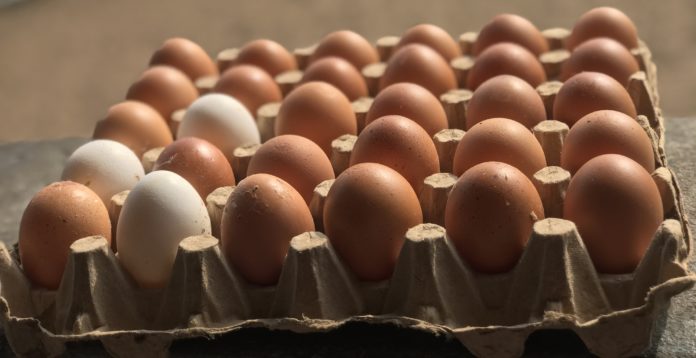The Ghana National Association of Poultry Farmers (GNAPF) has projected that a crate of eggs, which currently costs between GH¢20-24 depending on the size, could be sold at an average price of GH¢30 by December 2021.
The projection in price increase per crate is as well expected to affect the price of an egg, which currently sells at GH¢1.50 pesewas in most places.
The association has said the poultry sector is in dire need of support to stand on its feet amidst the negative impacts of the pandemic, which has become a threat to the already-collapsing industry.
Players in the poultry value chain are of the firm belief that until a pragmatic policy framework is put in place, the poultry industry cannot take its rightful place in contributing meaningfully to the country’s GDP.
Ghana currently imports over US$350 million (about 180,000 metric tonnes) worth of chicken annually, or the equivalent of five million chickens each week. The country’s own production equates to about 58,000MT whereas national demand is about 400,000MT.
Ghana also continues to import a chunk of its eggs from Ivory Coast.
But the Northern Regional Chairman of GNAPF, George Dassah expressed the association’s displeasure about the current economic situation affecting the poultry value chain.
He was addressing stakeholders in the poultry sector at the Ministry of Food and Agriculture (MoFA) conference room in Tamale.
With some poultry farms folding up due to the pandemic, the cost of feed has been skyrocketing as a result of the increasing price of maize being the major ingredient in poultry in feed production.
Feed cost currently constitutes 65 percent of the total cost of poultry production. Within the space of 12 months, from August last year, the cost of 100 kg of maize has risen from GH¢130 to GH¢320-350 depending on the location the farmer is purchasing from. Though there are opportunities to augment local production, the government’s assurance and policies for the sector are yet to fully benefit the majority of poultry farmers.
The status of the much-touted Broiler Revitalisation Programme by the government in 2020; to provide 4-million day-old chicks annually to poultry farmers for five years, has begun in the Greater Accra Region, albeit, with little sign of the initiative being spread evenly to benefit farmers nationwide.
GNAPF attributed challenges in the sector to neglect by successive governments adding, “the poultry fraternity has not experienced any concrete achievement over the years.”
The association feared that the situation would further increase the unemployment rate considering the frequency of closure of poultry businesses and its associated effects in the value chain. “We are appealing to the government to engage us in order to devise and implement policies that would lead to the subsequent revamp of the sector,” GNAPF implored.
The Greater Accra Poultry Farmers Association.
In July this year, the Greater Accra Poultry Farmers Association (GAPFA) held a similar media engagement on the challenges in the sector. GAPFA mentioned the high cost of maize, soya bean cake, and sorghum as the major deterrent factors aiding the collapse of the sector. In addition, the association noted that the unavailability of these ingredients on the market is further curtailing the poultry business.








